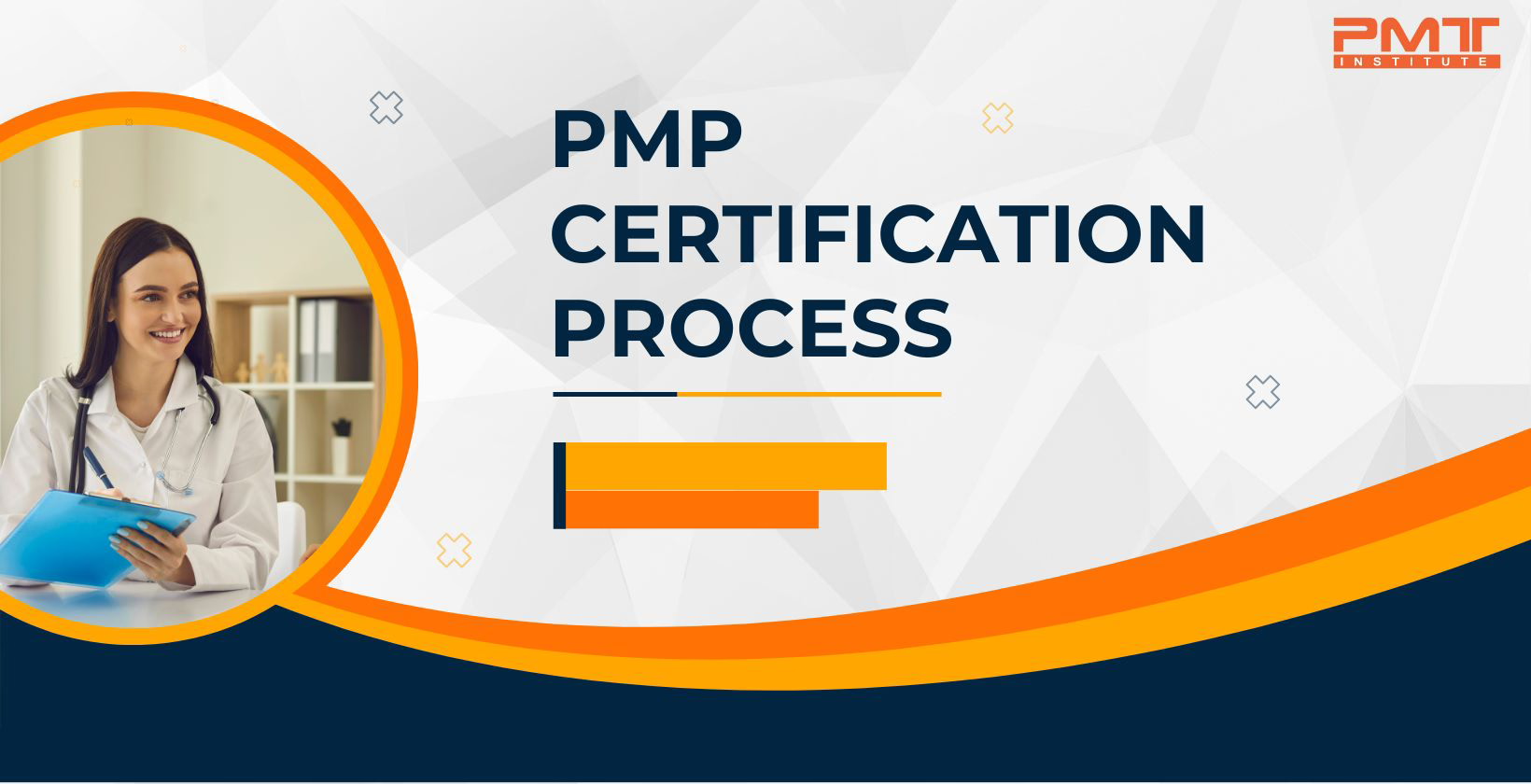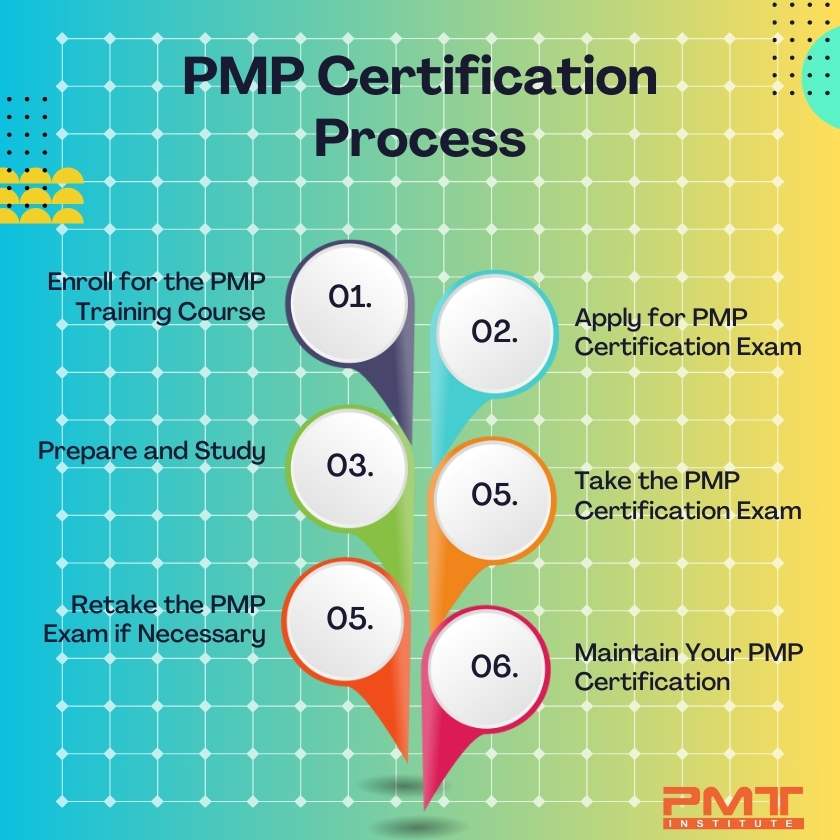How Long Does it Take To Get a PMP Certification? Process Timeline in 2024
Published:
Updated:

The Project Management Professional (PMP) certification is a globally recognized credential offered by the Project Management Institute (PMI). It demonstrates that a project manager has the necessary knowledge, skills, and experience to lead and direct projects effectively. PMP certification holders are highly respected and in demand in various industries such as information technology, healthcare, construction, and finance.
The timeline to obtain a PMP certification varies depending on individual circumstances, such as their level of experience, study habits, and the time they have available to study. It takes anywhere from 3 to 6 months to prepare for and pass the PMP exam.
Candidates must meet the requirements to be eligible to take the PMP certification exam. A secondary degree (high school diploma, associate's degree, or the global equivalent) with at least five years of project management experience, during which at least 7,500 hours were spent leading and directing project tasks, and 35 hours of project management education. On the other hand, a four-year degree (bachelor's degree or the global equivalent) with at least three years of project management experience, during which at least 4,500 hours were spent leading and directing project tasks, and 35 hours of project management education.
Table of Contents
Enroll for the PMP Training Course
Enrolling in a PMP training course involves several important procedures, including researching and selecting a course, registering for the course, attending the course, and preparing for the certification exam. These procedures ensure that an individual acquires the necessary project management education and skills required to pass the PMP certification exam and advance their career as a project manager.
Enrolling in a PMP training course is essential for several reasons. Firstly, it helps candidates to meet the eligibility criteria to sit for the PMP certification exam by providing the required 35 hours of formal project management education. Secondly, the course helps candidates prepare for the challenging PMP exam by providing them with the necessary knowledge and skills. Lastly, enrolling in a PMP training course is necessary to learn the latest industry best practices and standards for project management, which helps candidates advance their careers.
Apply for PMP Certification Exam
Applying for the PMP certification exam involves various important procedures, including meeting the eligibility criteria, completing the application form, paying the exam fee, and scheduling the exam. These procedures are necessary as it confirms the eligibility for the exam, register for the exam, and allow planning and preparation for the exam, leading to the attainment of the PMP certification and the advancement of the project management career.
Applying for the PMP certification exam is important for project managers as it validates their skills, enhances their credibility in the industry, increases their career opportunities, improves their earning potential, and makes them more competitive in the job market. Learn PMP application process before you apply with PMI.
Prepare and Study
Preparing and studying for the PMP certification exam is crucial to passing the exam and becoming a certified project management professional. Developing a study plan, reviewing study materials, taking practice exams, and joining a study group are all critical procedures that help to improve the chances of success.
Preparing and studying for the PMP certification exam is necessary for project managers as it helps them become familiar with the exam format, and identify knowledge gaps and areas for improvement. Additionally, it builds confidence and reduces exam anxiety, and gain a better understanding of project management concepts and principles needed to pass the exam.
Take the PMP Certification Exam
Taking the exam is the primary purpose of the entire certification process and is essential to becoming a certified project management professional. Completing the check-in process ensures that an individual meets the necessary requirements for taking the exam and provides a secure and controlled testing environment. Taking the exam is the primary purpose of the entire certification process and is essential to becoming a certified project management professional.
Taking the PMP certification exam is necessary for project managers as it validates their skills and knowledge in project management and enhances their professional credibility. Candidates that take the PMP exam demonstrate their commitment to the field. It helps the candidates advance their careers and increase their earning potential and provides more opportunities to work on high-profile projects and collaborate with other professionals in their field.
Retake the PMP Exam if Necessary
Retaking the exam provides an opportunity to improve the score and become a certified project management professional. Retaking the PMP exam if necessary involves identifying areas of weakness, developing a study plan, reapplying for the exam, preparing for the exam, and retaking the exam. Each procedure is important and necessary to increase the chances of passing the exam and becoming a certified project management professional.
Retaking the PMP exam is necessary for project managers who were not able to pass the exam on their first attempt. Additionally, retaking the PMP exam is important because it allows project managers to maintain their certification. PMP certification requires that certified project managers maintain their certification status by earning professional development units (PDUs) and passing a re-certification exam every three years. Project managers renew their certifications and continue to demonstrate their expertise in project management by retaking and passing the PMP exam.
Maintain Your PMP Certification
Maintaining the PMP certification involves earning PDUs, submitting PDUs, and renewing the certification every three years. It is to ensure that the certification remains valid and up to date. Additionally, to demonstrate the commitment to continuing professional development and maintaining professional knowledge and skills as a project manager.
Maintaining the PMP certification is important because it helps an individual to stay up-to-date with the latest trends, techniques, and best practices in project management. Maintaining the certification as the field of project management evolves, ensures that an individual is aware of the latest developments and able to apply them to their work.

What is the PMP Certification?
The Project Management Professional (PMP) certification is a globally recognized credential offered by the Project Management Institute (PMI). It is designed to show that an individual has the necessary knowledge, skills, and experience to lead and direct projects effectively. PMP certification holders are highly respected and in demand in various industries such as information technology, healthcare, construction, and finance. Candidates need to pass a rigorous exam that tests their knowledge of project management concepts, tools, and techniques. The test is based on the PMI's Guide to the Project Management Body of Knowledge (PMBOK Guide) to become a PMP-certified professional. Candidates must have a combination of education and work experience in project management, as well as demonstrate their commitment to continuing education in the field to be eligible for the PMP exam. PMP holders are required to maintain their certification through continuing education and professional development once certified.
What is the Timeline to Get PMP Certification?
The timeline to obtain a PMP certification varies based on individual factors such as previous experience, study habits, and the amount of time available for study. It is usual that candidates spend between 3 and 6 months preparing for and passing the PMP exam. Candidates must meet the eligibility criteria set by the Project Management Institute (PMI) before applying for the PMP exam. The criteria involve a combination of education and work experience in project management. Candidates begin the exam preparation process once eligibility is confirmed. The preparation process includes studying the PMBOK guide and other relevant materials to develop a deep understanding of project management concepts.
Candidates submit their applications to PMI for review after completing exam preparation. The application includes details about their education and work experience in project management. Furthermore, candidates schedule their PMP exam if the application is approved. The exam is a four-hour, 200-question multiple-choice test. Receive the score immediately once candidates complete the exam. Candidates who pass the exam are then awarded the PMP (Project Manager) certification. However, some candidates require additional time to study or need to retake the exam if candidates do not pass on their first attempt.
What are the Requirements for the PMP Certification Exam?
Listed below are the requirements for the PMP certification exam.
- Education:Candidates must have a four-year degree (bachelor's degree or global equivalent) from an accredited institution. Alternatively, candidates must have a high school diploma or an associate degree or global equivalent. Additionally, candidates must have completed at least 35 contact hours of formal project management education.
- Project management experience:Candidates must have at least three years of project management experience, during which candidates have spent at least 4,500 hours leading and directing projects.
- Project management education:Candidates must have completed at least 35 hours of formal project management education. The education is in the form of courses, workshops, or training sessions that cover project management principles and practices.
How Much Does the PMP Certification Cost?
The PMP certification cost varies based on several factors, including PMI membership status, location, and exam preparation materials. PMI membership is not required to take the PMP exam. However, members receive a discount on exam fees. Candidates need to pay a membership fee of $139 per year to become a PMI member. The PMP exam fee for PMI members is $405, while non-members need to pay $575. The fee includes one attempt at the PMP exam. Candidates need to pay an additional fee. Candidates need to purchase study materials or enroll in a PMP training course to prepare for the exam in addition to the exam fee. The cost of these materials varies but typically ranges from $50 to $1,500. The cost of study materials is reduced by taking advantage of free or low-cost resources, such as online study groups or practice exams.
PMP holders must maintain their certification through continuing education. It involves completing a certain number of Professional Development Units (PDUs) every three years. There are costs associated with obtaining PDUs, such as attending conferences or training sessions. The cost of obtaining PDUs varies, but some opportunities are free or low-cost. The cost of obtaining a PMP certification ranges from a few hundred dollars to over a thousand dollars, depending on factors such as PMI membership, location, and exam preparation materials. It is important to consider the costs carefully and budget accordingly when pursuing a PMP certification.
How Long Does the PMP Exam Take?
The PMP exam is a computer-based test that consists of 200 multiple-choice questions. The candidates must have four hours to complete the exam. The exam questions are a mix of situational, knowledge-based, and calculation-based questions that require candidates to apply their project management knowledge to real-world scenarios. It is significant to note that the PMP exam is a timed exam, and must complete within the four-hour time limit. Taking breaks is not allowed during the exam. It is essential to manage time effectively and pace the self throughout the exam to ensure that there is enough time to answer all the questions.
How Long would It take for a Highschool Get PMP Certification?
The Project Management Institute (PMI) requires that an individual have a minimum of a high school diploma or equivalent to be eligible for the PMP certification. However, the amount of time it takes to obtain the PMP certification depends on several factors, including education, experience, and study schedule. Candidates need to complete 35 hours of project management education/training before applying for the exam. The length of time it takes to complete the training depends on the format of the course and the availability. Candidates need to study for the PMP exam, which typically takes numerous weeks to several months depending on the learning style, prior knowledge, and study schedule. It requires applying for the PMP exam through the PMI website once candidates have completed the study. The study takes numerous weeks to several months depending on a learning style, prior knowledge, and study schedule. The exam needs to apply through the PMI website once the study is completed. It takes numerous days to numerous weeks for the PMI to review the application and determine eligibility.
How Long would It take for a College Graduate Get PMP Certification?
College graduate candidates are eligible to apply for the exam without completing the 35-hour education or training requirement if the candidate has completed a bachelor's or higher degree in project management or a related field. College graduate candidates need to schedule their exam at a Prometric testing center after the application has been approved. The availability of testing centers affects the timeline for scheduling exams.
The length of time it takes for a college graduate to obtain the PMP certification depends on their individual circumstances. However, it typically takes several months to a year to complete the required education/training, study for the exam, and complete each step of the certification process.
Is the PMP Certification Exam Hard?
The PMP certification exam is considered to be challenging by previous candidates who have taken it. The score is at least 61% or more of the questions correctly to pass the exam. The pass rate for the exam is generally around 60% to 70%, which means that many candidates do not pass the exam on their first attempt.
However, the difficulty of the exam varies depending on the level of experience, education, and preparation. The exam finds it easier for someone who is new to the field and has limited study time if candidates have extensive project management experience and have studied extensively for the exam. The PMP certification exam is challenging, but with adequate preparation, study, and experience, it is possible to pass the exam and obtain the certification.
Is It Possible to pass PMP in 2 weeks?
Yes, it is possible to PMP in two weeks. However, it requires significant dedication, focus, and preparation. It is recommended to dedicate a significant amount of time to studying and reviewing the PMBOK guide. Practice questions and simulations to gain familiarity with the types of questions that encounter on the exam to prepare for the exam within two weeks. Additionally, consider taking an intensive PMP exam prep course that provides a structured study plan and additional resources to help in preparing for the exam. It is essential to note that passing the PMP exam in two weeks is not common, and most individuals take several months to prepare for the exam.
Is the Free Training Course Certificate Accepted as PMP Requirements?
No, free training course certification is not accepted for PMP requirements. Completion of a free training course certificate alone is not accepted as meeting the 35-hour project management education or training requirement for PMP certification. The training course must be offered by a PMI R.E.P or PMI-approved course to be accepted. It is recommended to check with PMI or the specific PMP certification requirements to confirm if a particular training course is acceptable towards the 35-hour requirement. Free PMP certification training only provides a basic understanding of project management concepts, which is the reason for not being accepted as a PMP requirement. It does not cover all the topics and skills required to pass the PMP certification exam.


